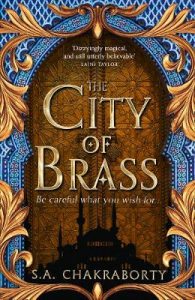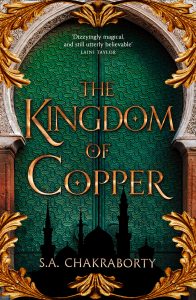THE CITY OF BRASS and THE KINGDOM OF COPPER by S. A. Chakraborty (BOOK REVIEWS)
“Fog shrouded the great city of brass, obscuring its towering minarets of sandblasted glass and hammered metal and veiling its golden domes. Rain seeped off the jade roofs of marble palaces and flooded its stone streets, condensing on the placid faces of its ancient Nahid founders memorialised on the murals covering its mighty walls”
The Daevabad trilogy by Shannon Chakraborty starts with The City of Brass, then continues in The Kingdom of Copper and ends with The Empire of Gold. Although I‘ve already shared my in-depth thoughts on The City of Brass back in July when Beth and I hosted a Women in SFF readalong, which you can read here, now that I’ve completed two of the books, I’m going to share more of my thoughts on Chakraborty’s immensely compelling series so far.

The City of Brass begins in Egypt, Cairo, where we meet our main protagonist, Nahri, a con artist and aspiring healer. However, her time in Cairo abruptly ends when she unwittingly casts a summoning incantation which leads to her being chased away from her home by ifrit demons.
I was immediately immersed and enchanted by this tale, from the very moment Nahri meets Dara and they travel on a magic carpet (yes my heart loved this so much!) escaping the ifrit, until they reach the hidden magical land of Daevabad. From then on the book explores the many castes of djinn settled within Daevabad and we learn of their conflict with the shafit – who are derogatorily called half-bloods for their half human and half djinn parentage. Through our next main protagonist Alizayd, a pureblood Daeva, we learn of the shafit rebels known as the Tanzeem, who are fighting against their oppression and abuse. Yet despite their efforts Alizayd’s father, King Ghassan, rules with a firm, cruel hand.
Chakraborty’s writing style is instantly charming, she writes a wonderful blend of atmospheric, richly detailed and highly emotive prose. Her worldbuilding is complex with much politics, history and prejudices between the various castes, which always kept me intrigued. She also incorporates much culture and religion, which creates a fulfilling level of depth. The highlight of the book for me was these diverse characters though, each have their flaws but they are easily likeable. Nahri is strong-willed yet caring, Dara is fierce, tortured, and Ali is naive, and idealistic but ultimately his heart is big.
Please be aware this next part of the review will contain spoilers for the ending City of Brass.
“You don’t stop fighting a war just because you’re losing battles, Alizayd. You change tactics. Surely, that’s a lesson you learned in the Citadel.”
In The Kingdom of Copper Chakraborty moves the story along and begins the next instalment five years after the ending of City of Brass. Nahri is married and settling into her role as Banu Nahid of Daevabad. Yet within those five years Daevabad itself has fallen into disarray. In Am Gezira, Ali is settling into his exile and discovering his awakening abilities. Our Dara, who we believed dead, finds himself awakening to once again be a slave of a new master, Manizheh, Nahri’s infamous mother.
“I’m tired of everyone in the city feeding on vengeance. I’m tired of teaching our children to hate and fear other children because their parents are our enemies. And I’m sick and tired of acting like the only way to save our people is to cut down all who might oppose us, as if our enemies won’t return the favour the instant power shifts.”
She drew up. “Bold words for the son of a tyrant.”
From the first chapter, I could sense this book was much darker than its predecessor. King Ghassan’s tyranny ever reigns and we see clearly the brutality he inflicts upon the innocent citizens of Daevabad and on our Banu Nahida too. The tension between the Daeva’s and the shafit reaches breaking point as both parties openly show their hostility. At every turn Nahri tries to counteract this by restoring her ancestor’s hospital and help provide much needed healthcare to not only the Daeva’s but also the shafit. Yet obstacles continually mar her path, the mere idea of Daeva’s and shafit working side by side, sharing each other’s medicinal techniques is taboo to many, and so her skills in trickery and manipulation come into play. Yet, throughout the narrative we see Chakraborty raises the stakes even higher, as a new threat, which our main protagonists are unaware of, is hell bent on making Daevabad tremble. As Nahri, and later Alizayd, try desperately to bring peace and healing to their city, I could see it’s destruction slowly creeping closer.
Having already become attached to these characters and seeing their impending doom, dear reader, this was a stressful book. Many times I found myself raging, worrying, and then back to raging again, or smiling at the lighter moments and then crying at their pain! Chakraborty’s prose, as you may tell, remains emotive as ever, yet it has also evolved and felt more refined. I absolutely loved seeing how our characters develop in this book, they all grow and change, for better or worse.
“Go steal some happiness for yourself, my friend,” she said softly. “Trust me when I say the chance doesn’t always come back.”
 One of my favourite aspects of this series is seeing a main protagonist who is a healer, rather than a more typical warrior in training. Yet Chakraborty also includes limitations to Nahri’s powers, she cannot fix everything or everyone with her abilities, which is always something I feel is important. Magic should never be a way to solve every problem and a protagonist cannot always be successful in everything they do. Nahri makes mistakes, or lacks the knowledge, but at every turn she tries her damn hardest. Chakraborty then portrays Dara as our morally grey character, however he cannot be wholly blamed for the violence and deeds he inflicts, and no matter what he did I could not help but feel sorry for him. As Chakraborty herself says, and this is something I agree with, Dara is very much a “pawn” to higher beings, a slave to their will, and at times he truly believes by destroying the corruption in Daevabad he is helping to rebuild a better world for his people, even if that means causing the deaths of many. I thoroughly appreciated watching the psychology behind that kind of character play out.
One of my favourite aspects of this series is seeing a main protagonist who is a healer, rather than a more typical warrior in training. Yet Chakraborty also includes limitations to Nahri’s powers, she cannot fix everything or everyone with her abilities, which is always something I feel is important. Magic should never be a way to solve every problem and a protagonist cannot always be successful in everything they do. Nahri makes mistakes, or lacks the knowledge, but at every turn she tries her damn hardest. Chakraborty then portrays Dara as our morally grey character, however he cannot be wholly blamed for the violence and deeds he inflicts, and no matter what he did I could not help but feel sorry for him. As Chakraborty herself says, and this is something I agree with, Dara is very much a “pawn” to higher beings, a slave to their will, and at times he truly believes by destroying the corruption in Daevabad he is helping to rebuild a better world for his people, even if that means causing the deaths of many. I thoroughly appreciated watching the psychology behind that kind of character play out.
I also enjoyed seeing the dynamics within the Qahtani family, as there is much bitterness held between them all. We see tension between Alizayd and his brother Mutandhir build throughout, and although Mutandhir frustrated me a lot throughout this book for many reasons, I did a swift u-turn on my opinion by the end. Zaynab, however, shines within this novel. She becomes the peacemaker, an ally and somewhat friend to Nahri, and in the end she puts her own life at risk to help the people of Daevabad. I would very much love to see more from her character. Another character I wish to see more of is Queen Hatset, Alizayd’s and Zaynab’s mother, who I was pleased to discover actually cared for her children, rather than wanted to control or manipulate them as some of the other parents desired to.
Lastly, the ending of Kingdom of Copper was so, so thrilling, it was exactly what I had been hoping for. Our main protagonists are finally brought together and are able to show their powers in full force, and I particularly loved seeing Alizayd’s manipulation of water, which fantastically contrasted Dara’s use of fire. Without spoiling anything there was a high-octane battle featuring all the magical creatures such as ghouls, ifrit, and briefly the marid, and then a very surprising twist hits you right in the epilogue. One that I’m still reeling over now.
The Daevabad trilogy is one of those hidden gems of which I am glad to have discovered this year.
Chakraborty has certainly taken me on a rollercoaster of emotions with these two instalments, yet I have also found them to be so comforting, the perfect books to curl up with and escape into. Suffice to say, I’m expecting to feel a whole lot more in The Empire of Gold.

